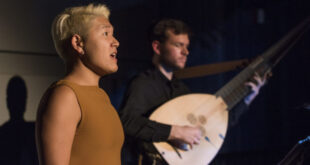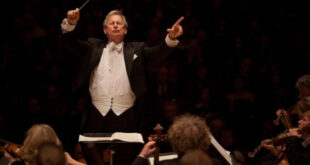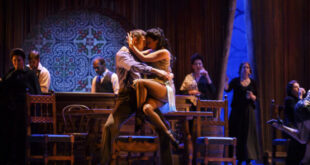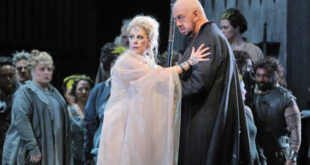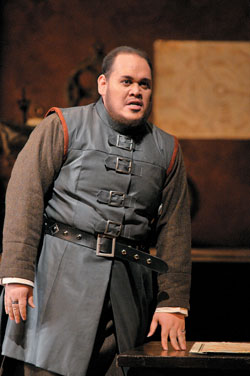 At this writing, Thanksgiving is less than two weeks away. I am thankful for many things, and one that I am most grateful for is that I can experience opera performed in Chicago just about as well as it can be done. The Met in New York for over a century was by far the greatest opera company in the USA, if not the world, but with the departure of Joseph Volpe and Franco Zefirelli, the quality of its productions are uneven at best. But you can count on the Lyric Opera of Chicago, however, to consistently stage outstanding productions. (At least they have been for about the last twelve or so years!)
At this writing, Thanksgiving is less than two weeks away. I am thankful for many things, and one that I am most grateful for is that I can experience opera performed in Chicago just about as well as it can be done. The Met in New York for over a century was by far the greatest opera company in the USA, if not the world, but with the departure of Joseph Volpe and Franco Zefirelli, the quality of its productions are uneven at best. But you can count on the Lyric Opera of Chicago, however, to consistently stage outstanding productions. (At least they have been for about the last twelve or so years!)
The November 15 performance of Verdi’s famous “Il trovatore” was a fine production, well worth seeing. I would first like to congratulate Chorus Master Michael Black for his outstanding direction of the Lyric chorus, on which this opera places a huge demand. In many operas the choral parts are afterthoughts–but not in “Il trovatore!” I was very impressed with their vocal precision and disciplined movement. They were simply great in their spooky accompaniment to Ferrando’s opening aria. And then the “Anvil Chorus”–one of the most popular tunes ever written. I think stage director Leah Hausman, probably taking her cue from the original director Sir John McVicar, should get the credit for the way that sledge hammers banged out the rhythm (first time I ever saw sledge hammers used here!). It was a bit humorous–but it was effective!
The chorus was also the star in the convent scene, leading up to the “pezzo concertante” finale of Act II. Leading off Act III was the great “Soldiers Chorus,” and once more the chorus shined brilliantly. As part of the legendary “cabaletta,” “Di quella pira,” the chorus actually eclipsed the tenor in musical power. Finally, the offstage “Miserere” in Act IV was very good–somber but excellent, really taking the musical and atmospheric lead from the principals–and that’s no mean trick.
As far as the sets go, they were mostly right on. I absolutely loved the Goya painting on the curtain before the performance–it established what I felt was exactly the proper mood for this tragic opera. The most clever use of the sets–their movement actually–was employed in the convent scene. This is a very tricky scene to stage, but set designer Charles Edwards was up to the challenge–first presenting di Luna and his men stage center, then revolving them out of sight–but you still know they’re there–so that Leonora and the nuns can have the prime attention. The only thing I had a problem with was this larger-than-life-sized “Corpus Christi,” a very powerful image, but one that seemed to have no dramatic purpose.
Conductor Asher Fisch, who also did a great job, is very fortunate to have such a fine group of musicians as the Lyric Opera orchestra is to work with, especially for an opera like “Il trovatore.” In this work Verdi composed a very complex and colorful score that requires virtuosity from every orchestral section, including the percussion. For me personally, one of the greatest joys about Lyric is hearing this fantastic ensemble play. The fourth act of “Trovatore,” with all its dark instrumental colors, was definitely a treat to hear.
I have always thought of Ferrando, the bass, as a principal singer, although technically he is not. Once more I thoroughly enjoyed the performance of Andrea Silvestrelli in this role, just as I did when he sang the Commendatore in “Don Giovanni” earlier this season.
The best of the principals was baritone Quinn Kelsey, as Count di Luna. He sang very well, most notably in the various ensembles and his Act II solo aria, “Il balen del suo sorriso.” He makes a great villain, bringing out his obsessive love for Leonora and hate for Manrico equally well.
The other principal singers, soprano Amber Wagner as Leonora, mezzo Stephanie Blythe as Azucena and tenor Yonghoon Lee all did justice to Verdi. What more could you ask?
 Fra Noi Embrace Your Inner Italian
Fra Noi Embrace Your Inner Italian


